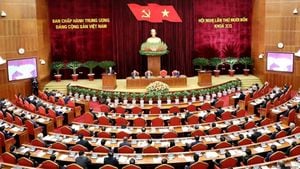Kalimantan Selatan has been abuzz with economic and social updates this past week, with various announcements shedding light on significant issues affecting the region's residents. On February 24, 2025, several bulletins were broadcasted from the Department of Social Affairs (Dinsos Kalsel) aimed at enhancing the competence of officers tasked with verifying poverty data. This initiative directly addresses the region's efforts to alleviate poverty and assess housing conditions, with officials pointing to 24,577 documented units classified as uninhabitable.
Specifically, Dinsos Kalsel has emphasized its commitment to improving the skills of their verification officers, stating, "Dinsos Kalsel tingkatkan kompetensi petugas pengesahan info fakir miskin." This move is part of broader efforts to build a more accurate picture of socioeconomic conditions across the province.
Further highlighting the region's health concerns, the Health Department of Balangan reported 42 cases of HIV/AIDS recorded within the same timeframe, reinforcing the need for increased public health initiatives. By stating, "Dinkes Balangan Kalsel catat 42 kasus HIV/AIDS pada 2024," health officials have acknowledged the urgency of responding to these health issues.
Simultaneously, the Banjarmasin City Government (Pemkot Banjarmasin) is actively reviewing policy measures intended to secure the operational viability of the public water treatment company, Perumda PALD. The financial troubles faced by Perumda PALD have come to the forefront, raising questions about how to manage its significant operational losses, which are quantified at about Rp500 million monthly against revenues of merely Rp94 million. Recognizing the problem, city officials have stated their commitment to addressing these financial questions as they regroup upon the return of Mayor H Muhammad Yamin.
“Kita tunggu Wali Kota untuk membicarakan lebih serius mengenai Perumda PALD ini,” remarked Vice Mayor Ananda, indicating the collaborative approach expected from the city's leadership to solve pressing issues.
Despite these challenges, there’s some optimism as the number of connections for household water services has climbed to 5,892. Yet, the stark reality is reflected by the long-standing losses faced by Perumda PALD since its inauguration, totaling around Rp99 billion from 2007 to 2021. “Kerugian terjadi nyaris setiap tahun. Rata-rata kerugian hingga Rp5 miliar,” noted Endang Waryono, the director of Perumda PALD, outlining the scale of the financial drought exacerbated by rising operational costs like electricity and chemicals.
The growth of infrastructure shortcomings, as depicted by the alarming number of unlivable homes and budgetary strains on public services, provides ample cause for concern among Kalimantan Selatan’s officials. Nonetheless, departments like Dinsos Kalsel and Dinkes Balangan are stepping up their activities to provide solutions and bridge gaps where necessary.
On another front, the Regional Industry Service (Disperin Kalsel) reiterated the necessity for bottled water industries to comply with the national SNI regulations, indicating not only the importance of health standards but also the push for maintaining quality throughout local production industries. This regulatory emphasis encapsulates the region's commitment to individualized health and safety protocols, ensuring access to safe drinking water as health and environmental conditions converge toward the goal of sustainable living.
The developments from Kalimantan Selatan reflect the struggles and resolve of local governments to adapt and overcome the financial and social hurdles of their communities. Each department is carving its path forward, veering toward solutions—whether through education, health care, or infrastructure improvements—as they aim to boost the standard of living for their constituents. And as officials prepare for upcoming meetings and strategy sessions, residents wait with hope for the impactful changes to come.
From striving to bolster poverty alleviation measures to ensuring safe drinking water compliance and addressing health crises, Kalimantan Selatan’s current focus remains on proving practical results from policies targeted at educational improvements and operational efficiencies. The concerted efforts from various departments, grounded on altruism and accountability, aim to uplift the province and instill confidence among its citizens.



